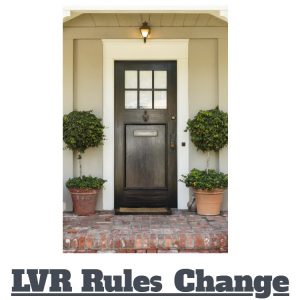The Reserve Bank released the latest six monthly Financial Stability Report (FSR) in the last week of November and it included some positive changes to the LVR rules for both first home buyers and for property investors.
The changes are effective from the 1st January 2019.
Let’s look at what the changes to the LVR rules and how these changes may help buyers in 2019.
But first we will look at why the rules were originally introduced.
 The Purpose Of The LVR Rules
The Purpose Of The LVR Rules
The Reserve Bank introduced LVR restrictions on 1 October 2013 to restrict how much a bank lends against mortgaged property, compared to the value of that property. The Reserve Bank introduced LVR restrictions in response to rapid house price growth at the time (especially in Auckland) and the to curb the increased use of low-deposit home loans. The policy was designed to help strengthen the banks balance sheets and when introduced it had an immediate dampening effect on housing market activity and house price inflation; albeit it has taken longer than expected to really slow down the market and price growth.
There were changes made to the LVR policy on 1st November 2015, 1st October 2016, 1st January 2018 and now on the 28th November 2018 The Reserve Bank released the latest FSR and has eased the LVR rules because, “both mortgage credit growth and house price inflation have eased to more sustainable rates, reducing the riskiness of banks’ new housing lending” remembering of course that the rules were always introduced only as a temporary measure.
The housing market has certainly slowed, house price inflation is now more controlled and the banks are acting more responsibly.
We expect that the LVR rules will be adjusted over time depending on the behavior of the banks and what is happening in the housing market and the overall economy. There is an expectation of further easing of the LVR restrictions but no mention of a date as to when they would be dropped altogether.
The Changes Will Help First Home Buyers
Come the New Year, the banks will be allowed to issue 5% more low deposit home loans which will mean more first home buyers will be able to get a low deposit home loan. The banks will be able to issue a maximum of 20% (up from the current 15%) of new home loans to owner occupiers who have a deposit of less than 20%.
That means an increase of 25% – that is a big increase!
Of course the banks will still need to act responsibly and not provide high levels of lending to people that may not be able to afford the loans.
On the other hand, we are pretty sure that the banks will continue to charge more to those people that have less than 20% deposit. The banks currently offer special home loan interest rates to people that have more than 20% deposit (or equity) but then charge a low equity margin (LEM) to people that have less than 20%.
The Changes Will Also Help Property Investors
On the 1st January 2019 the deposits required for property investors loans will also reduce.
Currently if you’re buying a residential investment property, or you’re using a residential investment property that you already own as security for a new loan then you will generally need at least a 35% deposit or equity.
From 1st January that changes so you will only require a 30% deposit.
This will make it a bit easier to buy an investment property, but also will help people to structure the lending correctly.
Get Advice From Mortgage Brokers
A lot of Kiwis will rely on the advice that they get from the banks.
This may seem the easiest place to get advice; however the advice that the banks can offer is generally limited to that specific banks policy and opinions. As mortgage brokers we do our own research, listen to the advice from economists and other professionals, but most of all we listen to everyday people and their unique situations. As well as the banks which are restricted by these rules we have access to non-bank lenders that can offer other solutions.
We encourage you to contact us to discuss your situation.
